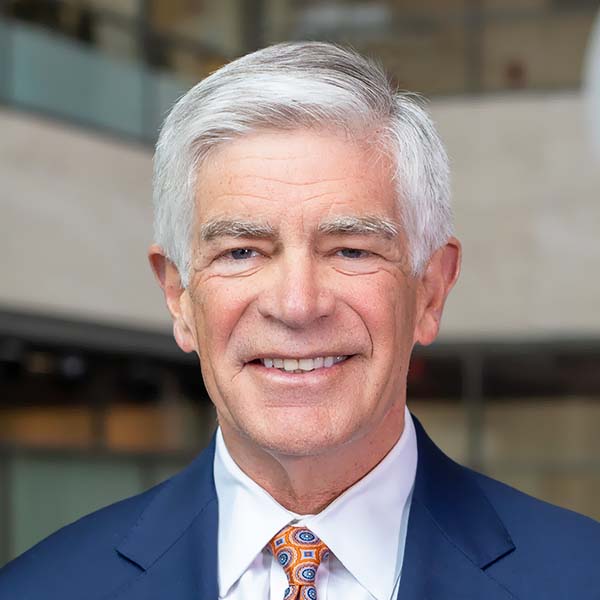Good morning, everyone, and welcome to the Federal Reserve Bank of Philadelphia. It is truly a pleasure for us to host this national convening.
While I certainly anticipate that you will enjoy your time here in the Bank, I hope that you will also be able to enjoy just a little bit of what makes the City of Philadelphia so special — and I don’t just mean the food.
As educators, I am certain you appreciate Philadelphia’s history and role as the birthplace of the United States, as both the Declaration of Independence and Constitution were framed and signed just a few hundred yards away. But as economic educators, this is also the birthplace of American central banking. The first Bank of the United States is just a few blocks away on Third Street, and the Second Bank is over at Fourth and Chestnut.
And, of course, there’s the Philly Fed’s own exhibit downstairs in the atrium. But I’m getting ahead of myself!
But in any case, standing before you, I see brought to life the statement from this city’s most famous resident, Benjamin Franklin, who wrote, “An investment in knowledge pays the best interest.” Of course, that only makes sense if you know how “interest” works.
We have the pleasure of spending the next 45 or so minutes together. And while I certainly don’t mind speaking to you, I would much more enjoy speaking with you. So, I plan to keep these remarks brief so that I can take some questions and we can have a conversation. With that in mind, I should take a moment to just remind everyone, including myself, that the views I express this morning are mine alone and do not necessarily reflect those of the Federal Reserve System or my colleagues on the Federal Open Market Committee (FOMC).
While I would make the case that it is always a good time for young people to learn basic economics, I would also make the case that there is no more pressing time for economic education than right now.
Economics is front-and-center in the news. Whether it be online, on television, or elsewhere, it is imperative for young people to understand what the news around them means. They are reading, watching, and hearing about “inflation,” among numerous other economic terms. And I’ve heard of very few social media influencers filling this space.
They need to be able to not just know what economic terms mean but to grasp, at least rudimentarily, the concepts and facts that underpin them.
We need our students — across all grade levels — to be able to know how our economy works. It isn’t vital to have an educated society that merely understands what economic words mean; it’s vital to have an educated society that understands how their decisions, as individuals, play a direct role in our economy. The decision to spend or save. The decision to go to college or enter the workforce. The decision to buy a new car or keep the old one roadworthy. The decision to pay cash or to take out the credit card.
And the more young people learn about the impacts of these decisions, the better it is for them as consumers and citizens, and the better it will be for our economy in the long run.
And this is where the “economics toolbox” that each of you can impart on your students becomes critical.
Students need to understand how credit works and what “interest” means long before they ever get access to a credit card, fill out a loan application for a first car, or to help pay for a college education.
They need to learn how labor markets work long before they settle on their chosen careers.
They need to understand how not just supply and demand, but also outside forces, impacts the prices they pay at the store.
They need to appreciate how money works across the economy and to have a healthy relationship with their own funds.
And, yes, they need to learn about the role of the Federal Reserve and the work we undertake here, at the Reserve Banks around the nation and in Washington, to meet our dual mandate of stable prices and maximum employment for the American people.
For so many, economic education has only been presented in an abstract. But in your hands, it is delivered in a more meaningful and directly impactful way. We’re not necessarily in the business of minting a whole new generation of PhD economists — though from point of view of a Federal Reserve Bank president, you can never have enough working around you — but rather we need more economically savvy citizens.
As president of the Philly Fed, I’ve spoken before numerous groups of students both formally and informally. One thing I’ve always tried to stress to them is that while what they read may make it appear that the Fed is the economy, in reality we are not. We have tools at our disposal to help guide the economy. That’s what monetary policy is for.
But I tell them that if they want to see the real economy, look at their neighbor and then look in the mirror — it is them, as future consumers, who are the economy. It is their decisions that will have the greatest impact on our collective economic direction. And the more we can equip them with information to make smart decisions, our economic future will be better.
And this is where you, as educators, come in. It can’t be left to a chance conversation with the president of a Reserve Bank or the opportunity to visit us here and walk through that exhibit I mentioned a few moments ago.
Economic educators are an important part of this equation. It is each of you who are the force multipliers making it possible for us to take scarce resources and reach as many students and teachers as possible. And so convenings like this allow you, as professionals, to receive additional training that enables economic knowledge and information to be taught more effectively, making it an integral part of the equation.
There’s a commercial on television where several adults are standing around a kitchen island and one of them makes the comment about the product saving them money, “With the economy and all.” A child among them asks, “What’s the economy?” And the adults all hem and haw until the child walks away, mumbling, “I’ll go look it up.”
I think that encapsulates, perfectly, why we’re all here.
Thanks to your continued efforts, that child will know — and if the commercial is to be remade it could be the child who educates the grown-ups.
The Philadelphia Fed will stand in support of those efforts, too. We’ll continue to produce high-quality materials that you can take into your classrooms. We’ll continue to be a resource you can rely upon.
I thank you for coming to Philadelphia. I hope you have an excellent time, both here during the conference and outside in the City of Brotherly Love and Sisterly Affection. And, finally, allow me to say, simply, “thank you” for all you do to move economic education forward.
Thanks for allowing me these few minutes to kick off the day. I’ll be happy to take some questions.
- The views expressed here are solely those of the author and do not necessarily reflect the views of the Federal Reserve Bank of Philadelphia or the Federal Reserve System.

